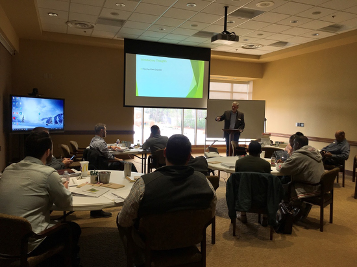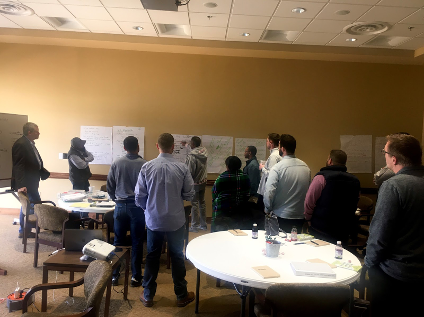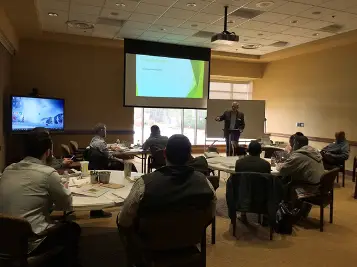By Tim Wicker
Churches from all across Arkansas work toward the goal of raising up church planters and sending them to start new works across their cities, the state, the nation, and around the world.

Throughout our history Arkansas Baptists have been working together to fulfill the Great Commission. One of the ways that is being done in Arkansas is through church planting, both here and around the world. The Arkansas Baptist State Convention (ABSC) has partnered with Arkansas Baptist churches to help them start and support new works by equipping them to provide prayer and resources, to sponsor and adopt new planters and their missions, and to identify and develop their own planters to start new churches.
Over the last couple of years, there have been over 20 ABSC churches that have worked through a process of becoming a “Sending Church.” They have joined with other churches and the ABSC’s Church Planting Team in “Sending Church Cohorts” to develop ways to plant new churches on a committed, on-going basis – to become Sending Churches. “It’s encouraging to be in a room to share about how God is moving in Arkansas,” said Will McKay, Senior Pastor of First Baptist Church in Monticello, Arkansas. These cohorts cooperated to develop best practices to identify, equip, and send out church planters from within their own membership. These cohorts met over the course of three months using three key questions to guide the development process:
- Who is the Lord preparing and calling out of our church, or in our circle of influence, to lead or be a part of a new church plant? (Identify)
- How do we equip and invest in these future leaders, preparing them for the ministry the Lord is calling them to? (Equip)
- Where and how is the Lord leading us to send out these new works? (Send)
During session one “Identify,” the cohort focused on “Calling out the Called” – identify those whom God is raising up to become church planters and leaders. They developed a profile of biblical qualifications, leadership skills, and characteristics common for successful church planters. The cohort also looked at ways to identify specific people in the church in whom God was at work. This involved prayerfully asking questions such as: Who in your church does the Lord seem to have His hand on? Who is leading people to Jesus and/or exhibits a personal passion for evangelism? Who is exhibiting a shepherding heart? Who is initiating new small groups or classes?
In session two “Equip,” the cohort worked through models for teaching and training these future leaders and church planters. There must be an intentional process to equip these planters in both their personal growth needs and, in the characteristics identified for successful planters. They first identified ways this is being accomplished organically within the ongoing ministry cultures in their churches. They also designed intentional practices through leadership pipelines, internships, and church planting residencies. Since each church has its own unique DNA, each church must learn how to invest in these future church planters in purposeful, strategic ways that best capitalize on the culture and methodologies within their specific context.
Session three emphasized ways for churches to “Send.” Each church at the Sending Church Cohort evaluated the ways the Lord was opening doors and giving them direction to plant new churches locally and nationally. They also focused on opportunities for replanting or adopting closed or dying churches in their areas.
This cooperative development process created numerous plans for the cohort churches to begin their church planting efforts. The churches focused first on ways that they could initiate their next new start. A few of the churches began identifying teams of leaders and members that could form the core for a new plant. Some churches committed to full support for a new plant, including ministry funds and salary support for the lead pastor/planter. Other churches began developing ways to utilize bi-vocational or co-vocational planters.

Additionally, at least four of these “Sending” churches are planning to start some sort of Church Planting Residency in the coming months. Church planting residencies typically last from 9-12 months and include church planter training, spiritual growth development, and on-the-job training opportunities to help prepare the future planter for the launching of a new mission, campus, or church. Each residency will look different as the Sending Church pours into its residents their own unique DNA.
The Lord is clearly at work in increasing the passion for church planting among Arkansas Baptist churches. The efforts of these Sending Churches to develop this cohort system will impact future churches by giving them specific ways to engage effectively in church planting. Tim Wicker, Team Leader for the ABSC Church Planting Team praised the long-term effect of these churches, “These pastors and leaders have worked together to give us all an incredible pathway where every church in Arkansas can identify future leaders/planters, intentionally and strategically equip the guys for God’s calling to plant new works, and then send them out as healthy new church starts.”
The tracks are now well laid for more churches to join the church planting movement. The Church Planting Team of the ABSC will be putting together more Sending Church Cohorts in 2020. For more information, please contact Tim Wicker at [email protected].

